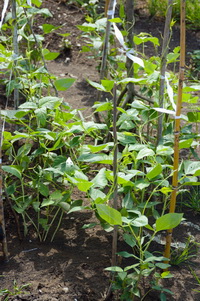
Ghana CSIR Affirms Safety of GM Crops
February 28, 2018| |
 Genetically modified crops are safer than conventional ones as they go through very rigorous tests and processes over many years before they are released onto the market, a biosafety and environmentalist research scientist at the Crop Research Institute of Ghana's Council for Scientific and Industrial Research (CSIR) has said. Charles Afriyie Debrah said there is no evidence that GMOs have been responsible for diseases adding that they are cheaper, more environmentally friendly and sustainable.
Genetically modified crops are safer than conventional ones as they go through very rigorous tests and processes over many years before they are released onto the market, a biosafety and environmentalist research scientist at the Crop Research Institute of Ghana's Council for Scientific and Industrial Research (CSIR) has said. Charles Afriyie Debrah said there is no evidence that GMOs have been responsible for diseases adding that they are cheaper, more environmentally friendly and sustainable.
Addressing members of the Ghana Agricultural and Rural Development Journalists (GARDJA) at a training on the basics of biotechnology, Mr. Debrah emphasized that GM technology is one of the several available options to help improve agricultural production and exuded confidence that the technology will offer farmers the best opportunity to scale up food production.
"This technology is an alternative. At the Crop Research Institute, we are doing research on GMOs but we are not letting go of the conventional," he said.
The training was part of a series of programs designed for editors and journalists to build on their understanding of biotechnology, Ghana's biosafety regulatory system, and the implications for food security and economic growth as the country gears up for GM crops commercialization.
Ghana's Biosafety Act (2011) allows for production and commercialization of GMOs in the country. The CSIR is currently undertaking field trials for GM rice and cowpea.Plans are at an advanced stage for environmental release application of cowpea in the year 2018-19.
For more on the workshop, contact Charles Afriyie Debrah, Biosafety and Environmentalist Research Scientist – CSIR, Crop Research Institute through email: degreatdebrahgh@gmail.com or cafriyiedebrah@ymail.com.
| |
Biotech Updates is a weekly newsletter of ISAAA, a not-for-profit organization. It is distributed for free to over 22,000 subscribers worldwide to inform them about the key developments in biosciences, especially in biotechnology. Your support will help us in our mission to feed the world with knowledge. You can help by donating as little as $10.
-
See more articles:
-
News from Around the World
- WEMA Gives Hope for Farmers Battling Armyworm in Kenya
- Ghana CSIR Affirms Safety of GM Crops
- Research Reveals New Approach to Improve Nitrogen Use, Enhance Yield, and Promote Flowering in Rice
- Researchers Monitor Photosynthesis in Soybean Using Invisible Light
- Scientists Discover Secret of How to Triple Number of Sorghum Grains
- India Launches Massive Pink Bollworm Awareness Campaign
- Increasing Sugar Yield and Biomass Production in Arabidopsis Discovered by VIB Scientists
- Land Plants Evolved 100 Million Years Earlier than Thought
- Study Shows How Plants Use 'Baits' to Trap Pathogens
-
Research Highlights
- RNAi-mediated Knockdown of GmFAD2-1B Improves Oil Quality in Soybean
- Rice Gene Confers Citrus Canker Resistance to Transgenic Mandarin
-
Beyond Crop Biotech
- Researchers Unlock Genetic Code of the Brightest and Most Vibrant Colors in Nature
-
Announcements
- BIO Asia International Conference
-
Resources
- Plants, Genes, and Agriculture Book
-
Plant
- CRISPR-Cas9 Used in Reverse Genetics Studies of Parasponia
- lncRNA1459 Knock-out Alters Tomato Fruit Ripening
- Researchers Apply CRISPR-Cas9 on Cacao Leaves
- Transgenerational CRISPR-Cas9 Induces Multiplex Gene Editing in Wheat
-
Read the latest: - Biotech Updates (February 18, 2026)
- Gene Editing Supplement (January 28, 2026)
- Gene Drive Supplement (February 22, 2023)
-
Subscribe to BU: - Share
- Tweet
